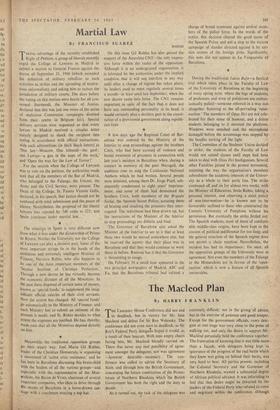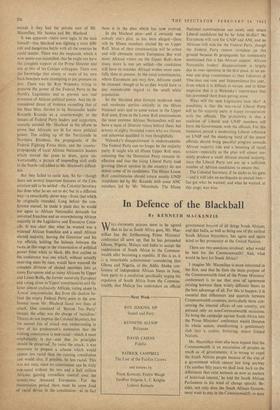The Macleod Plan
By HARRY F RANKLIN
THE Lancaster House Conference did not end in deadlock, but in victory for Mr. Iain Macleod and defeat for Sir Roy Welensky. The conference did not even start in deadlock, as Sir Roy's Federal Party delegates hoped it would, as a result of their boycott. With nine empty chairs facing him, Mr. Macleod blandly carried on. There has never any real possibility of agree- ment amongst the delegates; nor was agreement —however desirable—necessary. The con- ference was called to advise the Secretary of State, and through him the British Government, concerning the future constitution of the Protec- torate of Northern Rhodesia which the British Government has both the right and the duty to decide.
As it turned out, the task of the delegates was extremely difficult; not in the giving of advice, but in the exercise of patience and good temper. Except for the government officials, every dele- gate at one stage was very close to the point of walking out, and only the desire to support Mr. Macleod personally held the conference together. The frustration of knowing that it was little more than a façade, with delegates being kept in ignorance of the progress of the real battle which they knew was going on behind their backs, was very hard to bear. All parties present, including the Colonial Secretary and the Governor of Northern Rhodesia, wanted a substantial degree of African political advance. It was infuriating to feel that that desire might be thwarted by the leaders of the Federal Party who refused to come and negotiate within the conference, although outside it they had the private ears of Mr. Macmillan, Mr. Sandys and Mr. Macleod It was apparent—there were signs in the man himself—that Macleod was fighting a most diffiL cult'and dangerous battle with all the reserves he could muster. There was the suspicion, which it now seems was unjustified, that he might not have the complete support of the Prime Minister and one or two of his Cabinet colleagues. There was the knowledge that ninety or more of his own back-benchers were attempting to put pressure on him. There was Sir Roy Welensky trying to preserve the power of the Federal, Party in the North's Legislature and to prevent any. real extension of African political power. And the ill- considered threat of violence exceeding that of the Mau Mau. thrown in by Nationalist leader Kenneth 'Kaunda as a counterweight to the threats of Federal Party leaders and supporters, scarcely assisted Mr. Macleod in his efforts to prove, that Africans are tit for more political power. The calling up of the Territorials in Northern Rhodesia, the propaganda of the Federal Fighting Force there, and the counter- propaganda of local African Nationalist leaders which moved the press to draw, quite un- warrantably, a picture of impending civil strife in the North—all added to Mr. Macleod's difficul- ties.
But they failed to rattle him. So far—though there are several important features of the Con- stitution still to be settled—the Colonial Secretary has done what he set out to do; but in a different way—a remarkably clever way—from that which he originally intended. Long before the con- ference started, he made it plain that he would not agree to African Nationalist demands for universal franchise and an overwhelming African majority in the Legislative and Executive Coun- , cils. It was clear that what he wanted was a widened African franchise and a small African elected majority, leaving the Governor and his top officials holding the balance between the races, at this stage in the transmission of political power from white to black. His first outline to the conference was one which, without actually reserving seats by race, would have ensured the complete division of elected members into so many Europeans and so many Africans by Upper and Lower Rolls, the former massively European and voting alone in `Upper'constituencies and the latter almost exclusively African, voting alone in 'Lover' constituencies. But from the shadow be- hind the empty Federal Party seats in the con- ference room Mr. Macleod faced two lines of attack. One consisted of 'Boston Tea Party' threats; the other was the charge of 'racialism.' Threats do not impress the Colonial Secretary, but the second line of attack was embarrassing in view of his predecessor's statements that the existing constitution is non-racial--which it most emphatically is not—and that its principles should be preserved. To resist the attack, it was necessary to prepare a scheme which would appear less racial than the existing constitution and would also, if possible, be less racial. This was not easy, since no constitution can be truly non-racial without the two and a half million Africans gaining immediate control over the seventy-two thousand Europeans. For the transmission period there must be some kind of racial device in the constitution--as in fact there is in the plan which has now evolved.
In the Macleod plan—and it certainly was nobody else's plan. as has been alleged—there will be fifteen members elected by an Upper Roll. Most of their constituencies will be urban and will obviously return Europeans. But with more African voters on the Upper Roll—how many more is not yet settled--the candidates will have to consider African wishes more care- fully than at present. In the rural constituencies, where Europeans are very few, Africans could be returned, though to be so they would have to pay considerable regard to the small white population.
So the Macleod plan favours moderate men and moderate parties--entirely in the fifteen National seats and to some extent in the Upper Roll seats, Even in the Lower Roll constituencies the most extreme African Nationalists will not have a mass of illiterate voters behind them, but seventy or eighty thousand voters who are literate and otherwise qualified to vote thoughtfully.
Welensky's disappointment is understandable. The Federal Party can no longer be the majority party. It might win all fifteen Upper Roll seats, assuming that the Dominion Party remains in- effective and that the rising Liberal Party (and growing liberal opinion in the country) do not defeat some of its candidates. The fifteen Lower Roll constituencies should return mostly UNIP candidates led by Mr. Kaunda with some ANC members led by Mr. Nkumbula. The fifteen National constituencies can surely only return Liberal candidates led by Sit John Moffat? No Europeans will vote for UNIP and ANC and no Africans will vote for the Federal Party, though the Federal Party cannot complain on this ground because its propaganda has consistently maintained that it has African support. African Nationalist leaders' disappointment is largely due to over-optimism in the first place, to an un- wise and deep commitment to their followers of 'One man one vote' and 'Independence this year; from which it is difficult to escape. and to bitter suspicion that it is Welensky's interference that has prevented them from getting more What will the next Legislature look like? A possibility is that the non-racial Liberal Party will be the majority party in happy co-operation with the officials. The probability is that a coalition of Liberal and UNIP members will form the Government, with the officials. For this transition period a moderating Liberal influence on UNIP and the steadying hand of the senior officials should bring peaceful progress towards African majority rule and a lessening of racial tension—especially as the plan will almost cer- tainly produce a small African elected majority, since the Liberal Party can put up a sufficient number of African candidates to ensure this.
The Colonial Secretary, if he sticks to his guns —and it will take an earthquake to unstick him— has got what he wanted; and what he wanted, at this stage, was wise.







































 Previous page
Previous page